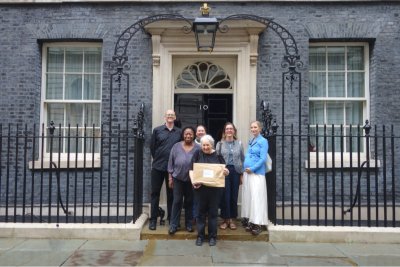 Handing in the letter. Credit: Chris Young / www.realbreadcampaign.org / Canva CC-BY-SA-4.0
Handing in the letter. Credit: Chris Young / www.realbreadcampaign.org / Canva CC-BY-SA-4.0

Real Bread Campaign in Downing Street delegation
PM urged to rebalance the UK's food system.
On 24 July 2025, a delegation to 10 Downing Street delivered an open letter to Prime Minister, Keir Starmer, and other ministers, urging the UK Government to put public health at the centre of rebalancing the food system. The letter was the latest action in the Fight Fake Food initiative, spearheaded by Rosalind Rathouse, founder of The Cookery School at Little Portland Street.
Joining her to deliver the letter were co-signatories:
- Mecca Ibrahim (Women in the Food Industry co-founder)
- Claire MacKenzie (Six Inches of Soil producer)
- Olivia Shave (journalist and shepherdess)
- Dolly van Tulleken (Nourishing Britain co-author)
- Chris Young (Real Bread Campaign coordinator)
Along with the letter they delivered a list of calls from:
- Naomi Duncan, Chief Executive of Chefs In Schools
- Sue Pritchard, Chief Executive of the Food Farming and Countryside Commission
- Dev Sharma, Youth MP, aood activist and founding member of Bite Back
- Stephanie Slater, MBE Chief Executive of School Food Matters
- Professor Tim Spector, co-founder of ZOE
- Anna Taylor, Executive Director of The Food Foundation
- Dr. Chris van Tulleken, author of Ultra Processed People
- Paul Wright, CEO of the Alliance for Children
The letter
Dear Prime Minister
Open letter to the UK Government: Rebalance the UK food system with public health at the centre
We, the undersigned, call on the UK Government to act on the below wishes from voices across the food, farming and medical profession to rebalance the UK food system with public health at the centre. Public health cannot be improved without transforming how food is perceived and consumed across society. We urge the government to lead this cultural shift—through education, regulation, and leadership—as a lasting legacy for current and future generations.
On 28 April the press picked up a shocking article, Premature Mortality Attributable to Ultraprocessed Food Consumption in 8 Countries, which was published in the American Journal of Preventive Medicine, and claimed that 18,000 people are dying prematurely each year from UPFs. This figure is far greater than the number of deaths caused by drug use of opiates (2,551 deaths) and cocaine (1,118 deaths) in 2023 and these are banned substances.
The UK's tobacco legislation - especially the ban on smoking in enclosed public places and workplaces - has been largely successful in improving public health. It has led to fewer hospital admissions, a shift in public attitudes, high compliance levels, and a steady decline in smoking rates. Strong public support also helped the UK set an example internationally. Comprehensive measures such as advertising restrictions and standardised packaging have been particularly effective among young people. This success offers a clear blueprint: if the Government wants to make meaningful progress on public health and leave a lasting legacy, similar bold action must be taken to regulate Big Food and reform food policy.
It took around 50 years from the initial establishment of the link between smoking and disease in the 1950s and 60s to the implementation of the smoking ban in Scotland (2006) and the rest of the UK (2007). In today’s technology-driven era, we expect legislation to evolve quickly, under this Government.
We welcome the Government’s recent cross-party commitment to tackling obesity, marked by the new inquiry from Parliament’s Health and Social Care Committee. We sincerely hope that the proposed "moonshot to end the obesity epidemic" will be implemented within the next 12 months—not delayed another decade. For this initiative to succeed, the Government must acknowledge and address the power imbalance created by Big Food — an underlying driver of obesity. While unproven weight-loss medication will undoubtedly play a role for those already affected, prevention remains the key. It is essential not only for improving public health but also for reducing long-term NHS costs.
We know from the COVID crisis that the Government can move at speed where saving lives is concerned. Unlike at the time of COVID where every death came as a shock, this UPF crisis and associated deaths are being ignored. Damage caused by UPFs are surreptitious and slow but ultimately are resulting in 18,000 deaths per year.
In Nourishing Britain: a political manual for improving the nation’s health, co-authored by Dr. Dolly van Tulleken and Henry Dimbleby, in interviewing Sadiq Khan, Labour Mayor of London, he said, “The main advice I would give to future administrations is to be brave and bold in their policies and their decisions, and to focus on building political consensus.”
If the Government were to endorse a positive cooking initiative that brings people together, helps citizens gain new skills, and improves health and wellbeing—especially during this time of low morale—it could be the boost the country needs.
Why this campaign now?
Rebalancing the UK food system around public health requires promoting healthy, sustainable diets; increasing access to affordable, nutritious food; and reducing health inequalities. This must go hand-in-hand with a focus on sustainable food production and supply, while addressing the environmental and socioeconomic factors that shape our food choices.
What we need is nothing short of a cultural food revolution.
The recent statistics speak for themselves. We must act now.
- Poor diets have surpassed smoking as a leading cause of preventable deaths
- It costs the UK alone £67.5 billion annually in healthcare costs
- 64% of adults in the UK are overweight or obese
- 51% of the UK daily energy in adults is made up from ultra processed foods (UPFs) and 68% in teenage diets
- 3 million+ people in the UK are malnourished or at risk of malnutrition
- Bowel cancer rates are rising in younger adults globally, with England experiencing the fourth fastest (3.6% per year) rise in the rate of early onset bowel cancer
- Constipation rates up 60% across primary-age child in England
- Five companies are responsible for more than 80% of TV ads for snacks and confectionery aired before 9pm
- If the obesity crisis is not slowed down more than 50% of adults worldwide will be overweight or obese by 2050, as predicted by The Lancet.
Yours sincerely,
Copies of the letter were adressed to:
- Ashley Dalton, Under-Secretary of State for Public Health and Prevention
- Lisa Nandy, Secretary of State for Culture, Media and Sport
- Bridget Phillipson, Secretary of State for Education and Minister for Women and Equalities
- Angela Rayner, Secretary of State for Housing, Communities and Local Government / Deputy PM
- Steve Reed, Secretary of State for Environment, Food and Rural Affairs
- Jonathan Reynolds, Secretary of State for Business and Trade
- Wes Streeting, Secretary of State for Health and Social Care
- The Lord Timpson, Minister of State for Prisons, Probation and Reducing Reoffending
- Daniel Zeichner, Minister of State for Food Security and Rural Affairs
Real Bread Campaign: Finding and sharing ways to make bread better for us, our communities and planet.
Sustain
The Green House
244-254 Cambridge Heath Road
London E2 9DA
020 3559 6777
sustain@sustainweb.org
Sustain advocates food and agriculture policies and practices that enhance the health and welfare of people and animals, improve the working and living environment, promote equity and enrich society and culture.
© Sustain 2026
Registered charity (no. 1018643)
Data privacy & cookies
Icons by Icons8







